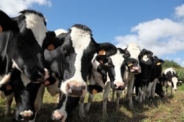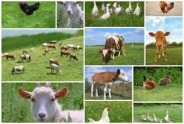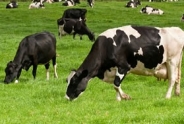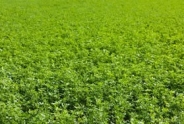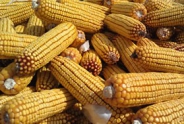Would a National Checkoff fit Organic?
A. Fay Benson, Small Dairy Extension Educator
South Central New York Dairy & Field Crops
What is a National Checkoff Program?by Elizabeth Burrichter, Organic Dairy Educator, Cortland County CCE
Do the sayings, 'Got Milk?', 'Beef: It's What's for Dinner,' or 'Pork. The Other White Meat' sound familiar? These promotions are all part of National Research and Promotion Programs, also known as commodity checkoff programs. These programs, overseen by the USDA, collect funds, called checkoff dollars or assessments, from producers, handlers or processors of a particular agricultural commodity. The goal of these programs is to maintain and expand existing markets, as well as to develop new markets. Some checkoff programs also fund agricultural production research.
The Organic Trade Association (OTA) has lobbied for such a program to promote the organic industry and distinguish it in the marketplace. The OTA believes that a major challenge for the organic sector is consumer confusion about what organic stands for, and this program would seek to help the consumer understand all that organic delivers through collective resources and coordination.
Unfortunately, the organic community is split on their support of this idea for an organic checkoff program.
Hurdles to such a program:
- Currently, 100 percent organic operations are exempt from any checkoff assessments under the 2002 Amendment.
- Before an organic checkoff program could take place, organic products would have to become a single commodity. The Commodity Promotion, Research, and Information Act of 1996 does not allow for more than one commodity to be part of a checkoff program, but OTA's proposal is to change that Act so that organics could become a single commodity.
- Several checkoff programs include a research component as an output, but because of the breadth of products included in this organic program, the research component would be the weakest link in the proposal. If all organic products are a single commodity, then research dollars would need to be spread evenly across every different production system. The diversity within organic production, i.e. field crops, orchards, vineyards, greenhouse production, etc., would prohibit the possibility of conducting thorough production research across all organic fields, which would be extremely expensive. Since production research would not be the main output of this program, funds would be focused on promoting organic products.
- Creating a conflict of interest is prohibited within the program. This means that all promotion must be generic, and that promotion cannot disparage another agricultural commodity. Funds cannot influence governmental action or policy or "pass through" the program in order to fund another organization. Any promotion that results from an organic checkoff program cannot promote organic food as better than conventional, but can explain exactly what organic certification entails as a production claim.
The current Farm Bill proposal addresses some of the hurdles to an organic checkoff program, with identical language in both the House and Senate versions. This text would allow for a â??technical fixâ?? in the regulatory language so that all split operations (farms that produce both organic and conventional products) would be exempt from conventional checkoff assessments, and not just operations that are 100% organic. Those opposed to the checkoff at the NY Organic Dairy Task Force meeting were in fact supportive of this measure.
While an organic checkoff program directed at consumer education sounds like a good idea, in actuality it would be very difficult and costly to attempt. Those involved in the organic dairy market know it was not created by a clever media campaign from Madison Avenue. It was created by dairy consumers demanding an alternative to milk from cows treated with Bst which began in 1994. How best to keep the trust of consumers is something every organic farmer should invest interest. To weigh in on the subject farmers can go to one of the websites listed below or they can go directly to their elected official in Washington.
http://www.ota.com/ORPP.htmlhttp://www.nodpa.com/checkoff_opposition.shtml
The New York Organic Dairy Task Force has been funded by the New York Farm Viability Institute since 2005. The Task Force is comprised of both organic dairy and crop farmers, certifiers, processors, and related support services. They meet twice a year and review opportunities and barriers to the organic dairy industry in New York. For more information go to: http://cuaes.cornell.edu/organic/projects/dairy/dairy-initiative/
Upcoming Events
2026 Soybean & Small Grains Congress
February 11, 2026
Henrietta, NY
Participant Registration for the 2026 Soybean & Small Grains Congress NOW OPEN!
2026 Forage Congress
March 12, 2026
Nunda, NY
Due to the unprecedented winter storm that recently impacted travel conditions across the region and U.S., combined with extreme cold temperatures and associated safety concerns, Forage Congress was postponed out of an abundance of caution. This decision was made with the safety of our participants, speakers, staff, and venue partners as the highest priority.
We are pleased to officially announce that Forage Congress has been rescheduled for Thursday, March 12, 2026, and will be held at The Nunda Ranch as originally planned.
Address: 2278-NY 436, Nunda, New York 14517
Sponsorship opportunities, vendor participation, and event registration are now open. We are excited to reconvene this important educational program and look forward to welcoming producers, industry partners, and speakers for a full day of applied, research-based forage systems programming.
From Dry to Fresh: Transition Cow Management Training
March 12, 2026
Albion, NY
This is a 1-day hands-on training in transition cow management offered in English and Spanish.

